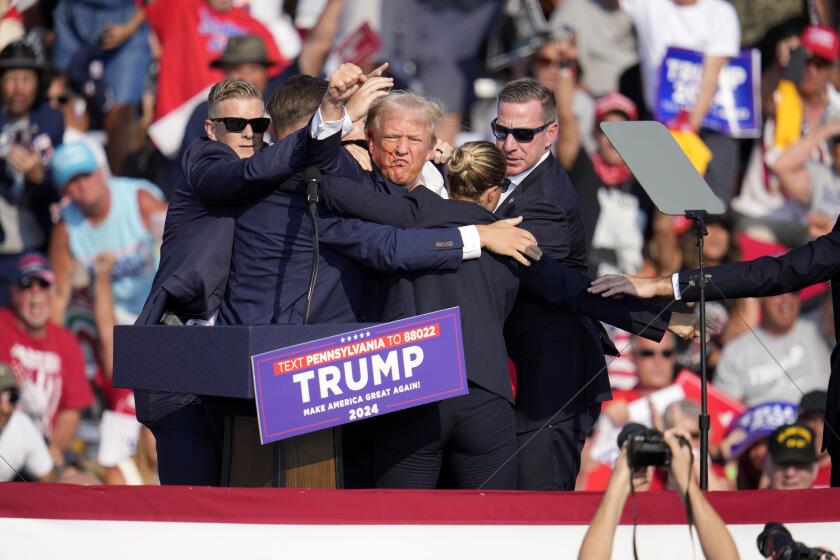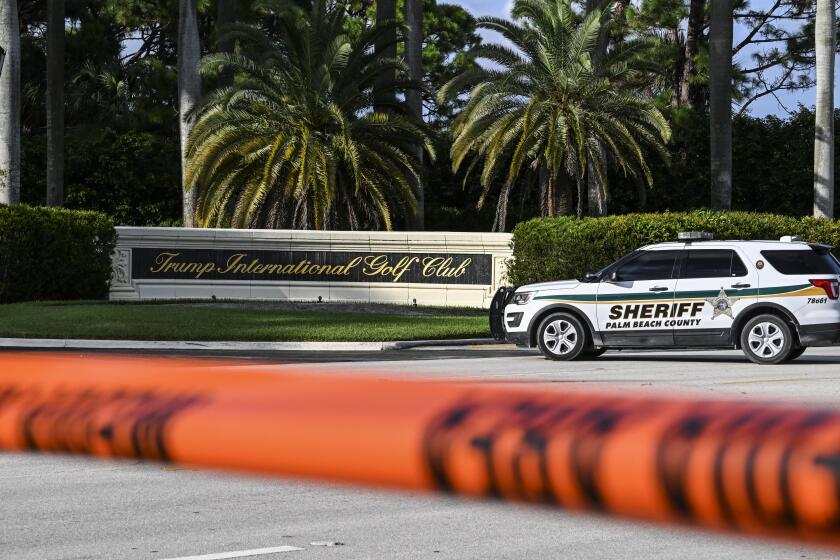A second assassination attempt against former President Trump raises new questions

A gunman’s ability to get within shooting distance of former President Trump on Sunday has again raised the specter of violence in the American political landscape, a development that analysts said is all too expected as Trump’s followers vowed it would make them even more determined to reelect him.
Just two months after a would-be assassin’s bullet clipped Trump’s ear in Butler, Pa., the Secret Service fired shots at a man with an assault rifle who had hidden himself in foliage less than 500 yards from the former president.
The motives of the suspect, identified by law enforcement sources as Ryan Wesley Routh, had not been revealed by late in the afternoon, but Trump followers immediately rallied around the former president.
“FIGHT! FIGHT! FIGHT! TRUMP 2024,” wrote one supporter on Trump’s Truth Social platform.
“The greatest warrior,” chimed in Kash Patel, a former appointee in Trump’s Defense Department.
In another post, Trump appears as a heroic figure, fists firing as he strides across a battlefield. “I AM SAFE AND WELL!” the missive read. “Our president Donald Trump.” It was followed by hands praying.
Donald J. Trump survived an apparent assassination attempt on Saturday — an attack that echoed previous shootings involving presidential candidates.
After the first attempt on Trump’s life, in July, supporters and even some neutral political observers predicted that the violence would push him to an insurmountable lead over President Biden.
But much has changed since then — most notably Biden’s failing debate performance, which caused him to drop out of the presidential race and to endorse Vice President Kamala Harris. By many measures since then, it has been Harris who has had the momentum in the campaign.
“Donald Trump’s high point of enthusiasm was immediately after the shooting in Pennsylvania, heading into his own convention,” said Mike Madrid, a Republican political consultant and ardent Trump critic. “The Republicans were absolutely convinced that they were going to win a landslide election.
“This latest incident gives his base yet another reason to show up and maybe for people on his side to say, ‘This is what we are fighting against,’ “ Madrid said. “But in terms of the enthusiasm gap, that advantage still goes to Harris and I wouldn’t think that will change.”
Said longtime Republican pollster Frank Luntz: “I was pretty sure that Trump’s defiant gesture after being fired upon [in July] would propel his reelection. To my surprise, it hasn’t even been the most important event of the campaign. This second shooting incident is not likely to have an impact, either. I don’t see anything other than a war having a meaningful, measurable impact on a decisive segment of the population.”
Colin Clarke, director of research at the Soufan Group, a global intelligence and security consulting firm, said his organization just held a large summit on political violence that was full of U.S. government officials and leading academics — attendees of which would not be surprised by Sunday’s incident.
Clarke said one of the major takeaways from the conference was that the U.S. was likely to see “a lot more political violence” moving forward given “the general polarization in this country, where everyone is heavily armed and pissed off.”
“Many people are concerned about what happens after November, no matter which candidate wins,” he said.
“The things that make people angry these days are ubiquitous, and it’s just so easy to get a weapon, and easier than I guess a lot of people thought to get close to a president or former president,” he said.
Data show extreme right-wing violence is the largest threat, but violence from the extreme left is also a danger, he said.
“There’s been a kind of reciprocal radicalization as the far right — these neo-Nazi scumbags — become more prominent,” he said.
Trump stokes anger and fear on a daily basis with his political rhetoric, which did not soften after the first attempt on his life, and Clarke said he worries that will only increase now.
“We’re pretty much in the thick of it here, and I’m just very concerned for the rhetoric as it ratchets up,” he said.
He said “a responsible leader should frequently talk about uniting the country instead of dividing it,” but he doesn’t expect that from Trump.
“The general political climate is more heated and more vitriolic and this is what sells — it’s part of the social media age, where being moderate doesn’t get you any clicks or followers,” Clarke said.
Some of Trump’s followers say that the sharp rhetoric against him, particularly critiques that say he is a threat to democracy, have spurred on those who would do him harm.
“The Democrats have put Trumps life in danger by calling him a danger to Democracy!” one follower said Sunday on Truth Social. “He had an attempted [sic] on his life on July 13th and the Democrats continued to call him dangerous! Now he just had another attempt on his life in West Palm Beach!”
The Secret Service said that it was investigating and that the incident occurred shortly before 2 p.m. “The former president is safe,” the agency said.
Dr. Garen Wintemute, who directs the Violence Prevention Research Program at UC Davis, has been studying political violence for years. Since 2022, his group has conducted a large, nationally representative annual survey on Americans’ support for — and personal willingness to engage in — political violence.
The group just got back its 2024 data, collected before the first attempt on Trump’s life, and Wintemute said it is encouraging in that it shows no increase in Americans’ acceptance of political violence from 2023.
In 2022, nearly a third of respondents said they believed violence was usually or always justified to advance at least one political objective. According to Wintemute, Republicans and MAGA-supporting Republicans were more likely than others to think that, as were white supremacists, conspiracy theorists and firearms owners.
In 2023, Wintemute said, racists, sexists, antisemites, homophobes and transphobes were similarly more likely to believe violence was justified to advance political objectives.
Still, Wintemute said that two-thirds of respondents in 2022 and three-fourths in 2023 rejected political violence. And, of the respondents who said they considered it justified for at least one political objective, the majority said they were unwilling to engage in violence themselves.
In the latest data, Wintemute said, “we’re not seeing an increase in support for political violence from 2023 to 2024 and there was an increase from 2022 to 2023.”
He said that was “good news” considering 2024 is an election year, and he had anticipated support for political violence to go up.
For the first time this year, Wintemute said, they asked people how likely they were to participate as a combatant if large-scale violence broke out, and again found “good news”: “The vast majority of people — 85% or so — said it wasn’t likely that they would participate as a combatant.”
Almost as important, he said, was a finding that, of those who said they would not be a combatant, most were not open to changing their views if urged to by family or friends. But among those who said they would be a combatant, many said they would be open to changing their minds.
What that shows, Wintemute said, is that “we have to be committed to preventing retaliatory violence” by being vocal about our opposition to it.
“It’s our job to be wet ground, so that when a spark of political violence falls, it stops right there and it doesn’t initiate a conflagration — there’s no response to it,” he said.
“It’s also our job — the vast majority who reject violence — to speak out about that.”
Another academic who has done a survey of Americans and their attitudes toward political violence said more needs to be done to condemn such attacks.
“All political leaders and presidential candidates should immediately condemn political violence,” said University of Chicago political scientist Robert A. Pape, “regardless of whether it comes from the left or right, rather than wait for a spiral of escalation to occur.”
Pape surveyed more than 2,000 Americans in late June, before the first attempt on Trump’s life on July 13. The survey found a disturbing willingness, across the political spectrum, to say that violence was warranted to eliminate political foes.
The poll, from the Chicago Project on Security & Threats, released in June, showed that 6.9% of Americans — or the equivalent of 18 million adults — believed that it was justified to use force to restore Trump to the White House. In another question, 10% of Americans — or the equivalent of 26 million adults — said they believed political violence is justified to prevent Trump from becoming president again.
The researchers found that millions of those, in both camps, who said political violence would be warranted also owned guns.
“What’s happening, unfortunately, is directly in line with our surveys,” Pape said, “which show not only people are supporting the use of force to prevent Trump from becoming president, but many of them are gun owners.”
More to Read
Updates
8:55 a.m. Sept. 16, 2024: This article was updated to attribute additional comments to Dr. Garen Wintemute.
Get the L.A. Times Politics newsletter
Deeply reported insights into legislation, politics and policy from Sacramento, Washington and beyond. In your inbox three times per week.
You may occasionally receive promotional content from the Los Angeles Times.














